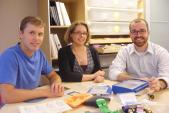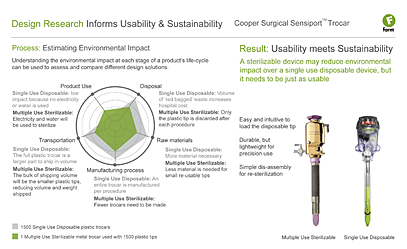
Industrial Design, Farm
Sustainability is part of good design. It is a natural extension of the traditional product development goals of efficiency and quality. Sustainable design strategies that lead to streamlined production, optimized materials usage, minimized weight, and reduced waste are all real opportunities for competitive and economic advantage for our clients.
Throughout Farm’s product development process, concepts are evaluated for attributes including usability, aesthetics, cost and manufacturability. Sustainable Minds LCA enables us to easily ‘prototype’ a concept’s life cycle impact and integrate environmental performance into our evaluation criteria as well. The software’s flexibility enables our project teams to make informed estimates about environmental impact very early in the development process while concepts are still evolving.
We’ve also used Sustainable Minds LCA to learn from past projects. We look for examples where examining the product life-cycle may have uncovered opportunities for user and manufacturing stakeholder goals to align with improved environmental performance. These examples help build our team’s knowledge of applied sustainable strategies and also demonstrate the value of a product life-cycle approach to our clients.
One of the challenges for sustainability in medical devices is single use disposable instruments. While single use devices are preferred for infection control and may have usability benefits (no assembly required), they also create a large volume of waste that puts an increasing cost burden on hospitals as well as the environment.
Farm worked with Cooper Surgical on a trocar for minimally invasive surgery. This device was intended to replace fully disposable plastic trocars with a re-sterilizable metal instrument and a smaller disposable plastic component.
Because it required the use of metals with high impact factor scores and still had a disposable component, we were interested in whether the re-sterilizable instrument would actually score better in an LCA. We used Sustainable Minds LCA to run the numbers and found that it did score better when compared across a projected number of uses. We used the results to create a LiDS (life-cycle design strategy) wheel graphic that compared the product life-cycle of both trocars.
The multiple re-uses of the metal trocar offset the higher material manufacturing and transport impacts. Even when factoring in the disposable plastic component over multiple uses, the re-sterilizable trocar still reduced environmental impact.
The availability and accessibility of information is critical for integrating sustainability into the product development process. Determining which approaches are truly effective for reducing environmental impact can be a complicated ecology of trade-offs. Sustainable Minds LCA gives us a quick way to make estimates, check assumptions, and make informed recommendations throughout the development process.







 View larger
View larger